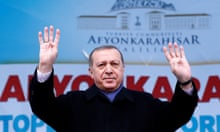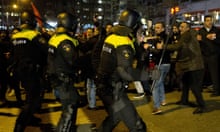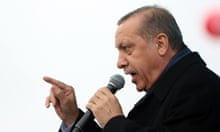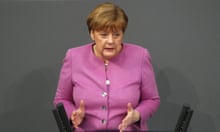The Turkish prime minister has threatened the Netherlands with sanctions in retaliation for the expulsion of a government minister from the country as she tried to visit the consulate in Rotterdam.
Binali Yıldırım said the Dutch authorities had violated Fatma Betül Sayan Kaya’s diplomatic immunity when she was barred from entering the consulate as part of a Turkish referendum campaign.
What happened in the Turkish referendum and why does it matter?
On 16 April 2017 Turkish voters narrowly approved a package of constitutional amendments granting Recep Tayyip Erdoğan sweeping new powers.
The amendments will transform the country from a parliamentary democracy into a presidential system – arguably the most significant political development since the Turkish republic was declared in 1923.
Under the new system – which is not due to take affect until after elections in June – Erdoğan will be able to stand in two more election cycles, meaning he could govern until 2029.
The new laws will notionally allow Erdoğan to hire and fire judges and prosecutors, appoint a cabinet, abolish the post of prime minister, limit parliament’s role to amend legislation and much more.
The president's supporters say the new system will make Turkey safer and stronger. Opponents fear it will usher in an era of authoritarian rule.
The Netherlands opposed the visit because it clashed with next week’s Dutch general election, prompting an international row that threatened to overshadow the parliamentary poll on Wednesday.
The Dutch prime minister, Mark Rutte, said Kaya’s visit was “irresponsible” and she had defied requests from The Hague to stay away. “Since last week [foreign affairs] minister Bert Koenders and I have been constantly trying to de-escalate the situation,” he told WNL Op Zondag. “We need to talk about this.”
On Sunday Rutte called the Turkish government’s stance bizarre and unacceptable and called for talks to resolve the impasse. He said Turkey had crossed a diplomatic line. “This has never happened before,” he said, “a country saying someone is not welcome and then them coming regardless.”
During a standoff in Rotterdam lasting around four hours, Kaya accused police of violating “human rights, democracy and international law” by barring her entry to the consulate. Just after 1am she was led away to a car, protesting vocally, and escorted over the border to Germany, from where she flew back to Ankara by private jet.
Around an hour later police dispersed the remnants of a crowd of several thousand demonstrators using water cannon and mounted charges. Twelve people were arrested and several shop windows were smashed on Rotterdam’s Plein 1940, but large-scale violence was avoided.
The crowd gathered outside the consulate during the evening, chanting slogans and waving Turkish flags as the events were broadcast live on several Turkish news channels.
Yıldırım said Turkey would respond to Kaya’s expulsion with “strong countermeasures”. The residences of the Dutch ambassador, chargé d’affaires and consul general in Ankara were sealed off on Saturday night in what were described as security measures.
The row escalated swiftly on Saturday after the Dutch government withdrew permission for Turkey’s foreign minister, Mevlüt Çavuşoğlu, to land in the Netherlands by plane. Çavuşoğlu had had a request turned down on Friday to address a campaign rally in support of plans by the Turkish president, Recep Tayyip Erdoğan, to extend his powers, which Turks will vote on in a referendum next month.
Koenders said talks between the two governments had broken down when Çavuşoğlu said on television that Turkey would respond to the ban with sanctions. In a statement, the government said: “The search for a reasonable solution proved to be impossible. The verbal aggression by the Turkish authorities that followed today [Saturday] is unacceptable.”
Erdoğan branded the Netherlands “Nazi remnants” and fascists in response to the landing ban. It follows a similar row with the German government when Çavuşoğlu was banned from speaking in Hamburg, prompting Erdoğan to draw comparisons with the Nazi era.
What are the issues in the Dutch election?
The fundamentals of the economy are recovering well from the global financial crisis, with unemployment at a five-year low and economic growth at 2.3%. Healthcare and pensions are significant topics of debate, but in the absence of major economic concerns the biggest issue is immigration and integration. The agenda has been driven by the anti-Islam and anti-EU populist rhetoric of Geert Wilders, as well as the wider political climate across Europe. Dominant themes of discussion have included multiculturalism, globalisation, sovereignty, Dutch values, and how far the EU works – or doesn’t work – for the Netherlands. Read our comprehensive preview
The mayor of Rotterdam, Ahmed Aboutaleb, said at a press conference just before 2am that Kaya had been designated an “unwanted foreign national” and ordered to leave the country with her security personnel.
Aboutaleb claimed Turkey’s consul general had given him false assurances that the minister would not be going to the consulate. “He lied flat-out. He called on people to come to the consulate where the minister would be giving a speech,” Aboutaleb said.
In response to Erdoğan’s comments, the mayor said: “They ought to know that I’m the mayor of a city that was bombarded by the Nazis.”
The Dutch far-right leader Geert Wilders seized on the row as he looked to revive his flagging election campaign before Wednesday’s vote. Wilders, who is campaigning on a platform of “de-Islamising” the Netherlands, said on Twitter: “The Netherlands can see that these people are Turks, not Dutch. They have Dutch passports but they don’t belong here.”









